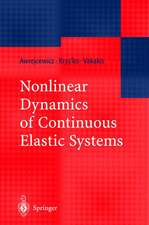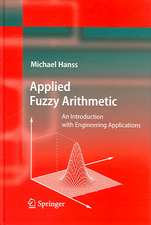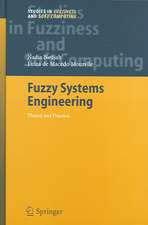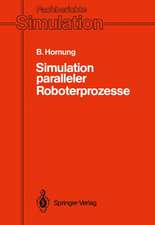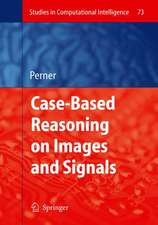Computational Engineering - Introduction to Numerical Methods
Autor Michael Schäferen Limba Engleză Paperback – 21 iul 2022
The successful and efficient application of such tools requires certain basic knowledge about the underlying numerical techniques.
The text gives a practice-oriented introduction in modern numerical methods as they typically are applied in mechanical, chemical, or civil engineering. Problems from heat transfer, structural mechanics, and fluid mechanics constitute a thematical focus of the text.
For the basic understanding of the topic aspects of numerical mathematics, natural sciences, computer science, and the corresponding engineering area are simultaneously important. Usually, the necessary information is distributed in different textbooks from the individual disciplines. In the present text the subject matter is presented in a comprehensive multidisciplinary way, where aspects from the different fields are treated insofar as it is necessary for general understanding. Overarching aspects and important questions related to accuracy, efficiency, and cost effectiveness are discussed.
The topics are presented in an introductory manner, such that besides basic mathematical standard knowledge in analysis and linear algebra no further prerequisites are necessary.
The book is suitable either for self-study or as an accompanying textbook for corresponding lectures. It can be useful for students of engineering disciplines as well as for computational engineers in industrial practice.
| Toate formatele și edițiile | Preț | Express |
|---|---|---|
| Paperback (2) | 505.18 lei 6-8 săpt. | |
| Springer Berlin, Heidelberg – 20 feb 2006 | 505.18 lei 6-8 săpt. | |
| Springer International Publishing – 21 iul 2022 | 1112.15 lei 6-8 săpt. | |
| Hardback (1) | 1118.30 lei 6-8 săpt. | |
| Springer International Publishing – 20 iul 2021 | 1118.30 lei 6-8 săpt. |
Preț: 1112.15 lei
Preț vechi: 1356.29 lei
-18% Nou
Puncte Express: 1668
Preț estimativ în valută:
212.80€ • 222.79$ • 176.09£
212.80€ • 222.79$ • 176.09£
Carte tipărită la comandă
Livrare economică 05-19 aprilie
Preluare comenzi: 021 569.72.76
Specificații
ISBN-13: 9783030760298
ISBN-10: 3030760294
Pagini: 373
Ilustrații: XIII, 373 p. 252 illus., 22 illus. in color.
Dimensiuni: 155 x 235 mm
Greutate: 0.54 kg
Ediția:2nd ed. 2022
Editura: Springer International Publishing
Colecția Springer
Locul publicării:Cham, Switzerland
ISBN-10: 3030760294
Pagini: 373
Ilustrații: XIII, 373 p. 252 illus., 22 illus. in color.
Dimensiuni: 155 x 235 mm
Greutate: 0.54 kg
Ediția:2nd ed. 2022
Editura: Springer International Publishing
Colecția Springer
Locul publicării:Cham, Switzerland
Cuprins
Introduction.- Modeling of Continuum Mechanical Problems.- Discretization of Problem Domain.- Finite-Volume Methods.- Finite-Element Methods.- Other Discretization Methods.- Time Discretization.- Solution of Algebraic Systems of Equations.- Properties of Numerical Methods.- Finite-Element Methods in Structural Mechanics.- Finite-Volume Methods for Incompressible Flows.- Lattice-Boltzmann Methods for Flow Simulation.- Computation of Turbulent Flows.- Acceleration of Computations.
Textul de pe ultima copertă
Numerical simulation methods in all engineering disciplines gains more and more importance.
The successful and efficient application of such tools requires certain basic knowledge about the underlying numerical techniques.
The text gives a practice-oriented introduction in modern numerical methods as they typically are applied in mechanical, chemical, or civil engineering. Problems from heat transfer, structural mechanics, and fluid mechanics constitute a thematical focus of the text.
For the basic understanding of the topic aspects of numerical mathematics, natural sciences, computer science, and the corresponding engineering area are simultaneously important. Usually, the necessary information is distributed in different textbooks from the individual disciplines. In the present text the subject matter is presented in a comprehensive multidisciplinary way, where aspects from the different fields are treated insofar as it is necessary for general understanding. Overarching aspects and important questions related to accuracy, efficiency, and cost effectiveness are discussed.
The topics are presented in an introductory manner, such that besides basic mathematical standard knowledge in analysis and linear algebra no further prerequisites are necessary.
The book is suitable either for self-study or as an accompanying textbook for corresponding lectures. It can be useful for students of engineering disciplines as well as for computational engineers in industrial practice.
The successful and efficient application of such tools requires certain basic knowledge about the underlying numerical techniques.
The text gives a practice-oriented introduction in modern numerical methods as they typically are applied in mechanical, chemical, or civil engineering. Problems from heat transfer, structural mechanics, and fluid mechanics constitute a thematical focus of the text.
For the basic understanding of the topic aspects of numerical mathematics, natural sciences, computer science, and the corresponding engineering area are simultaneously important. Usually, the necessary information is distributed in different textbooks from the individual disciplines. In the present text the subject matter is presented in a comprehensive multidisciplinary way, where aspects from the different fields are treated insofar as it is necessary for general understanding. Overarching aspects and important questions related to accuracy, efficiency, and cost effectiveness are discussed.
The topics are presented in an introductory manner, such that besides basic mathematical standard knowledge in analysis and linear algebra no further prerequisites are necessary.
The book is suitable either for self-study or as an accompanying textbook for corresponding lectures. It can be useful for students of engineering disciplines as well as for computational engineers in industrial practice.
Caracteristici
2nd edition with updates and also new content Completeness of modern numerical methods to solve engineering problems Oriented to the most important application areas in mechanical, chemical, and civil engineering Discussion of the methods for an efficient practical use of numerical simulation techniques
Recenzii
From the reviews:
"This book covers several important methods used in engineering models. … this book may provide engineers with an introduction to numerical methods … . the book will be of more … value to those interested in the computational aspects of the problems, or to those interested in the mathematics." (Jeffrey Putnam, ACM Computing Reviews, Vol. 49 (5), 2008)
"This book covers several important methods used in engineering models. … this book may provide engineers with an introduction to numerical methods … . the book will be of more … value to those interested in the computational aspects of the problems, or to those interested in the mathematics." (Jeffrey Putnam, ACM Computing Reviews, Vol. 49 (5), 2008)
Descriere
Descriere de la o altă ediție sau format:
Useful for engineers, this book offers an introduction to modern numerical methods in engineering. It covers applications in fluid mechanics, structural mechanics, and heat transfer as the relevant fields for engineering disciplines, such as computational engineering, mechanical engineering, as well as chemical and civil engineering.
Useful for engineers, this book offers an introduction to modern numerical methods in engineering. It covers applications in fluid mechanics, structural mechanics, and heat transfer as the relevant fields for engineering disciplines, such as computational engineering, mechanical engineering, as well as chemical and civil engineering.





